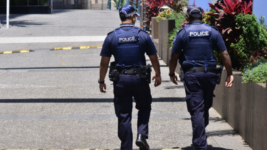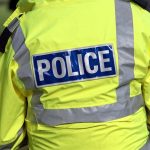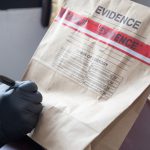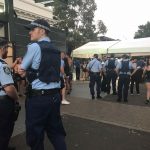Queensland Police to Get Random Stop and Search Powers

Subject to limited exceptions such as at airports and during certain events, Australian law enforcement agencies are required to have a suspicion on reasonable grounds that a person has committed, or is committing, an offence, or that other dangerous circumstances exist, before they are legally permitted to stop and conduct a warrantless search upon them.
If they break this rule, any evidence derived from the illegal search – such as illicit drugs or offensive weapons – are subject to being excluded from court proceedings.
But this long-standing and fundamental rule is set to change in Queensland, with the state’s officers set to receive unprecedented powers to randomly stop and scan people in safe night precincts, on public transport, parks and even on the streets.
Gold Coast trial
The expanded powers are being introduced after a trial of the use of hand-held metal detectors on the Gold Coast.
The ‘wands’, as they are called by Queensland police, are hand held metal detectors used to scan over a person’s body. They set off an alarm, such as a sound, or lights or a vibration, if they detect metal.
According to police, the Gold Coast trial involved 16,000 searches and resulted in the seizure 197 weapons including knives, machetes and of course “knitting needles”.
The state government says the use of the ‘scanning wands’ has been so effective that the trial was to be expanded to different locations for the next two years.
But now, legislation has been introduced with a view to making the arbitrary searches permanently lawful across the state.
Unprecedented expansion of police powers
Queensland Police Minister Mark Ryan says the changes currently before Parliament will “allow police to use hand-held metal detection scanners to scan over the exterior of a person’s clothing and belongings to search for the presence of a knife”.
“These are exceptional powers, you don’t see powers like this in many places around the world,” he told the media. “Police will be able to conduct scanning randomly on anyone who is in a public place in the prescribed area”
“They won’t need a reasonable suspicion that a person is carrying a knife or doing anything wrong in order to scan them.
Failure to submit to a search will be a criminal offence.
Police powers to stop and search in New South Wales
In New South Wales, police powers to stop and search a person or vehicle are primarily contained in the Law Enforcement (Powers and Responsibility) Act (LEPRA) 2002.
The term ‘suspects on reasonable grounds’ is used throughout the LEPRA, and it means officers cannot conduct arbitrary or random searches of you or your vehicle – they must have some factual basis upon which to base their suspicion that you have done something wrong; such as committed an offence or have something illegal or dangerous on you or in your vehicle.
So when are you required to disclose your identity?
Part 3 of the LEPRA outlines when a person is required to disclose their identity after being approached by police.
If an officer holds a reasonable suspicion that a person can assist in the investigation of an ‘indictable offence’ (ie one which may be decided in a higher court) because they were in the vicinity of the incident, they can require the individual to disclose their identity. Police can make the same request of someone they reasonably suspect has an apprehended violence order out on them.
Police can also require a person who is being given a direction to leave a public place to reveal their identity. Under section 197 of the LEPRA, police can require a person to leave a public area for a number of reasons – including where they’re harassing or intimidating others, or are suspected of supplying illegal drugs.
An individual is required to reveal their identity in all of these situations, and failure to do so, or providing a false name or address, can result in a fine of up to $220.
A person must also disclose their identity if suspected of committing an offence on a train or railway property, or if they are under 18 and suspected of consuming alcohol in public.
When you’re driving a car
An officer who has a reasonable suspicion that a vehicle was or is being used in connection with an indictable offence can require the driver, any passengers and the owner of the car (if the owner wasn’t driving) to reveal their identity.
Failure to disclose at this time, or the provision of false information, can result in a fine of up to $5,500 and/or 12 months imprisonment.
Section 19 of the Act says that police who require a person to reveal their identity may also request identification to prove it.
Drivers who are pulled up during a routine traffic stop are must provide their name and address upon request, and section 175 of the Road Transport Act 2013 requires drivers to produce their licence to verify this.
When your car has been involved in a traffic offence
Section 177 of the Road Transport Act gives police the power to require a ‘responsible person, or the person having custody of the vehicle’ to disclose the name and address of a driver where it is alleged that a person has used that vehicle during a traffic offence. This is known as a ‘form of demand.’
Police must inform the owner or custodian of the vehicle of the date and time of the alleged incident, and the registration number of the vehicle allegedly involved.
Failure to comply can result in a fine of up to $2,200.
A person is not guilty of failing to comply if they persuade the court that they did not know and ‘could not with reasonable diligence have ascertained the driver’s name and home address’
Face coverings
An amendment was made to the LEPRA in 2011 under the Identification Legislation Amendment Act, which led to the inclusion Section 19A that requires a person to remove a partial or full facing covering when asked by a police officer for the purposes of identifying them.
Failure to remove a face covering can result in a $220 fine, or if an individual is travelling in a vehicle, it can result in up to a $5,500 fine and/or 12 months imprisonment.
While this law applies to any type of face covering, including dark sunglasses, it was introduced after a Muslim woman wearing a niqab was pulled over.
Carnita Matthews was stopped by police for random breath testing. It was alleged that she subsequently reported that an officer tried to forcibly remove her face covering. She was charged with making a false statement, but successfully appealed her conviction, after a judge found there was not enough evidence that Ms Matthews had making the statement.
Search without a warrant
Part 4 of the LEPRA details when police have the power to stop, search and detain an individual without a warrant.
Officers can do so when they reasonably suspect that a person possesses stolen property, has anything used or intended to be used to commit an offence, is carrying a dangerous item or weapon, or is in possession of an illegal substance.
Police may seize and detain any of such items.
Police also have ancillary powers to order a person to open their mouth for the purpose of a search, and to shake their hair if they suspect something is being concealed within it. Failure to comply with this request can result in a maximum penalty of a $550 fine.
A person can also be searched in a public place or a school if officers have a reasonable suspicion that they’re carrying a knife or a laser pointer. An officer can confiscate such items, and failure to comply with the search can result in a fine of up to $5,500.
Searching a vehicle without a warrant
Police can stop, search and detain a vehicle without a warrant if they have a reasonable suspicion that it contains stolen items, has been used in an offence, is carrying anything used, or to be used, in an offence, or is carrying any illegal substances.
If a vehicle is in a public place or in the vicinity of a school, police can search it if they reasonably suspect it contains a dangerous item, or is putting the public at risk.
Officers can seize and detain any such items.
A vehicle can also be stopped by police if they have a reasonable suspicion it is carrying a person they have grounds to arrest and detain.
Failure to comply with such directions under these circumstances can result in a fine of up $5,500 and/or 12 months imprisonment.
The dreaded strip search
Under section 31 of the LEPRA, police have the power to carry out strip searches if they deem it necessary for the purposes of a search. This can be done at a police station or in any other place if considered it must be done urgently.
A strip search must be conducted in a private area by a member of the same sex. At no time should a person’s body cavities be searched, nor should a person be touched in any way.
No person should be present who is not needed for the purposes of the search, nor should any item of clothing be removed unnecessarily.
Strip searches must not be carried out on children under the age of 10.
So there you have it – a thumbnail sketch of the rules surrounding stopping, requiring identification and searching individuals and vehicles in NSW.
If you feel that you have been illegally stopped and searched, it may be a good idea to consult an experienced criminal lawyer, especially if you’ve subsequently been fined or charged with a criminal offence.








